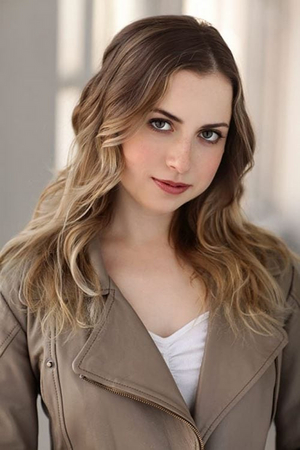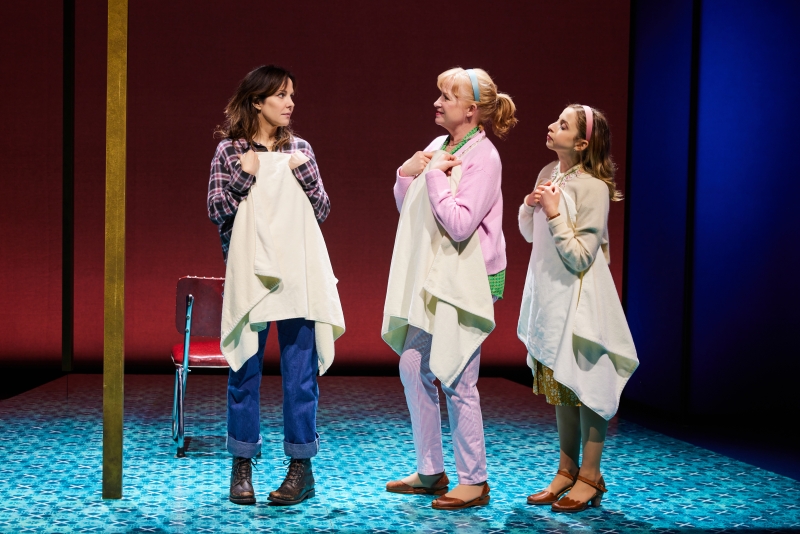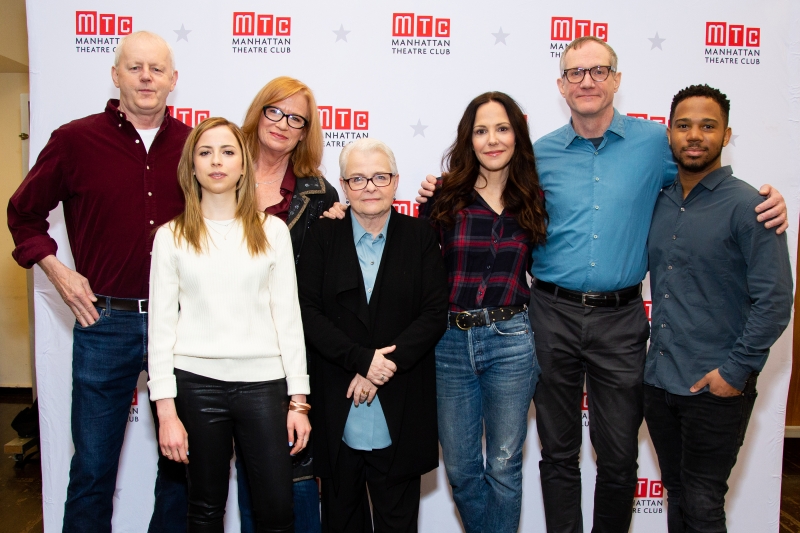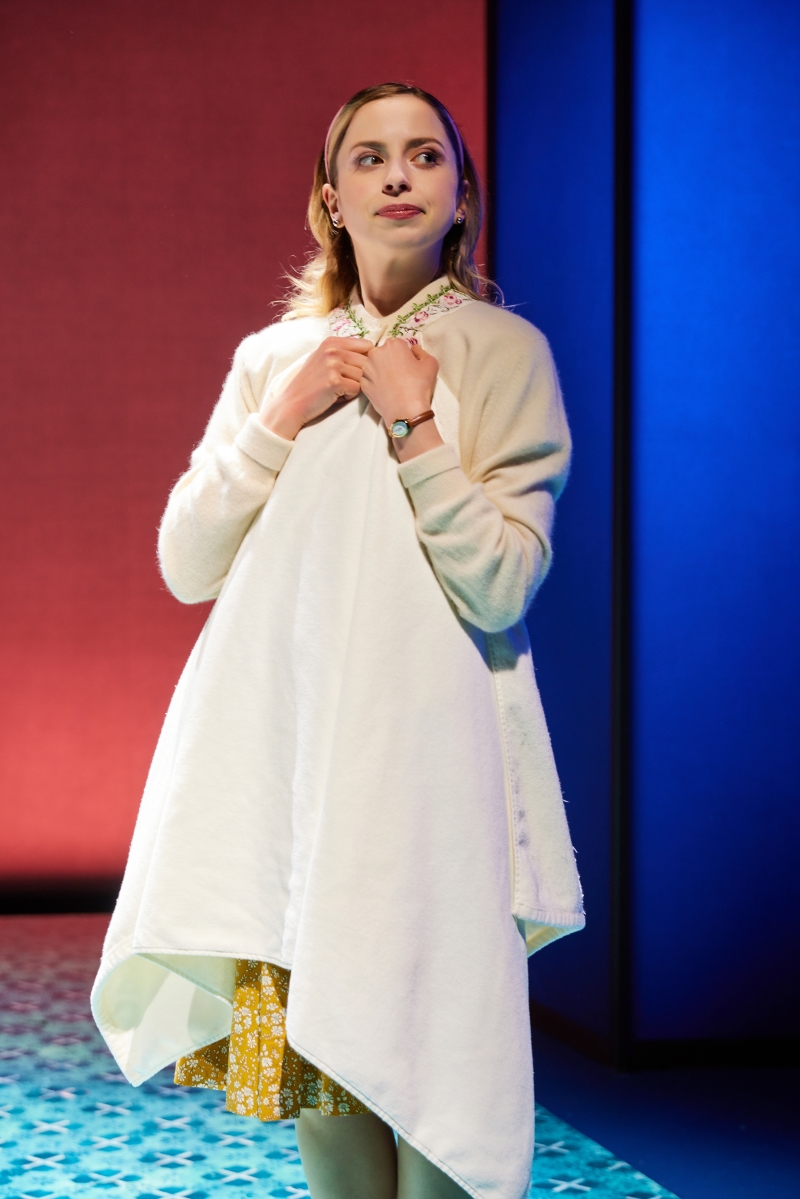Interview: Alyssa May Gold Talks Starring in HOW I LEARNED TO DRIVE on Broadway
BroadwayWorld spoke with Alyssa about her journey to Broadway, how playing poker has helped her as an actor, working with the cast of How I Learned to Drive & more.

Alyssa May Gold is taking the Broadway stage by storm as the Teenage Greek Chorus in the Broadway premiere of How I Learned to Drive. Currently in previews, How I Learned to Drive is set to officially open on Tuesday, April 19.
In addition to her talents as an actor, Alyssa had a past life as a high-stakes poker player, playing in the World Series of Poker in Vegas as a teenager, and is the founder of a theatre and production company, Pocket Universe.
BroadwayWorld spoke with Alyssa about her journey to Broadway, how playing poker has helped her as an actor, working with the cast of How I Learned to Drive, and much more.
This is 'technically' your Broadway debut - and I say technically because you were an understudy in Arcadia on Broadway a decade ago. How are you feeling now as you prepare to star in How I Learned to Drive on Broadway?
I'm feeling incredibly thrilled to be doing it-thrilled is the word that is the most potent to me right now because it's creating a role on Broadway. And that's part of why it really feels like my Broadway debut. This is the first time this play is being done on Broadway, and I'm getting to create the Teenage Greek Chorus for this production, and then get on stage and do that every night. And it feels like right now we're going up the roller coaster, about to have that thrilling drop down into the run. And so, I'm feeling thrilled, and I'm feeling so relieved that we're back. When we left in March of 2020, we were just about to finish our first pass through the show, but we never actually did the last scene. So we kind of never knew how our production ended. And now to have gone through the whole show, and getting to know how it ends, it's such a relief. So, I'm thrilled and relieved.

You have had an incredibly interesting road to Broadway. Broadway by way of poker. Can you tell me a little bit about your background and how you came to be an actor?
Yeah! Acting came first, but not by a lot. I guess I figured out that I wanted to be an actor when I was four, and saw the Annie movie for the first time, like most human children who want to be actors. And it took me many years to convince my very smart parents to let me start auditioning. And against all of their better judgement, they let me go to an open call for the TV movie of Annie. And I got close enough that I was like, "Oh, this is what I'm doing for the rest of my life, I'm good, I'm set, I'm in." And the following decades have been this really wonderful balance of auditioning, and acting, and working, and then also having all of these other lives, including a couple of years as a tournament poker player.
My dad taught me how to play when I was... I had to have been seven or eight, and he taught me Five Card Draw. And I was this weird kid walking into third grade with poker chips and a deck of cards, and taught all of my friends how to play. This industry is really hard, and it can make you really small, and it can make you feel like you don't have power, or that you don't have agency, and in my early twenties my parents thought, "You should go and actually play tournament poker for real, and go hold your own in rooms of people in high stakes games." Because poker really is like acting.
I run this company called Pocket Universe, which is a theatre and film production company dedicated to reconsidering and reimagining the classic storytelling conventions that shaped western theatre, and kind of western culture in general. And it was around the time that I started producing that they thought it would be a really good experience for me to have and take up a little bit more space, and behave a little bit more strategically, in a really high stakes environment. And so, my dad taught me Texas Hold'em, and he taught me how to bet, and he taught me how to represent the hand that you want other people to think that you have, not necessarily the hand that you have, and how to read other people. And we went out to Vegas, and I played the main event of the World Series of Poker, and I made it to day three, which was insane! It is also like acting, where you have to do everything with an intention of having an impact on the person across from you. And the most successful players are just masters of intentional action. And I really took a lot of that back with me, both into acting and into producing, and into my day to day life. It's made me a much more aware and intentional person.
And so, I've had this crazy last couple of decades of being able to go really live in the world as a person, as a poker player... I worked as a baker, I worked in real estate, I worked in restaurants, I worked in everything. And then I get to kind of come back and be an actor and share with people the human experiences that I've been having via the plays and films and TV shows that I get to work on.
That's so cool. That's definitely not the typical trajectory!
No [laughs]. It's been a really crazy couple of decades.
Jumping back to How I Learned to Drive, can you tell me more about who you play?
Yes! I play the Teenage Greek Chorus. This play has five characters, there's Li'l Bit, our protagonist, and her Uncle Peck, and that's Mary Louise Parker and David Morse. And then there is a three-person Greek Chorus, and we kind of each have two roles. So, we have our roles as the Greek Chorus that are very much part of Lil' Bit, and we are there to support her in telling the story, and we kind of help shift the action as we go. But then, in true Greek Chorus fashion, we each also play several roles within the story. So, I also play her grandmother, and I play one of her classmates, then I also play her as an 11-year-old at the very end. And it's really interesting getting to play the oldest woman in the story and the youngest woman in the story.
It's really interesting having to figure out to how to be in scenes where I'm the oldest. I'm with Johanna [Day] and Mary Louise, and Mary Louise is playing the youngest person on stage in those scenes. And Paula [Vogel] has really leaned in to the memory play of it, where it's really about embodying that time in someone's life, less than trying to be a caricature of an age, but rather embody the status and the essence and the relationship dynamic between... that section is called Three Generations Sit at a Kitchen Table, and that's what we're each representing in that moment. It's such a nuanced and juicy way to explore the generational trauma and power that women pass down to each other.

How has it been working with this incredible cast?
It's a dream. What's so wonderful about it is that these actors have this status in our industry that they have because they are so good at their jobs. It's really an unparalleled treat to walk into a room where everyone just operates at 100. Everyone kind of joked the first day that we did this in 2020, "Oh, I don't know any of my lines, I don't remember...", this group was off-book within the first week! And it really just elevates the level of work that you're able to do right off the bat.
I think they're probably like this in every room that they're in, but also working with three actors and a director who did this 25 years ago and have been living with this play, and getting to work with the people who created it, and feel so strongly about it, has been really inspiring. It's been a happy accident that Chris Myers, who's the other new cast member, and I, have now had two years to have worked on it, and let it work on us, and then come back to it. So now we have five people who are all kind of coming back to the show with different amounts of time in between, but we've all sat with it for longer than just four weeks of rehearsal.
It's kind of wild that it's the Broadway premiere, it has such a long history.
Yeah! I mean, I think that's something that we all have a lot of questions about, and I think it's something for us as an industry to consider. Why did it take so long for this play to make it to Broadway? That doesn't track, it won the Pulitzer Prize in 1997. I think there is something that is really indicative of how far we still have to go as an industry and as a culture with what stories about women we're willing to give the loudest platform. Because there is no other play like this. I don't think I've ever read a play that is this nuanced and complicated and honest about something in ways that is uncomfortable. There are things that are very clear, there are relationship dynamics that I think we can all look at and go, "This is clearly wrong," but there are human dynamics that there are more layers to. And this play really gives you space to contemplate them in a way that we clearly are uncomfortable with if it's taken 25 years for something that has touched so many people on paper, and in regional productions, and in productions all around the world, and in the original Off-Broadway run... I think it's worth us all taking a step back and considering why don't we give women space to tell their own stories like this.
Absolutely, that is a question we should be considering and thinking about with everything that we do. But you are helping with that. You mentioned that you created a theatre and production company called Pocket Universe. Can you tell me more about that?
Pocket universe was founded in 2017 when I wanted to set Julius Caesar in an all-girls high school, because I wanted to give young women access to one of the best texts we have about power. That play really centers on four different people with four very different relationships to power, who will stop at nothing to get it. And I just don't know anybody who embodies that better than teenage girls. But we really don't write plays that give them space to see themselves reflected in that way. We tend to really downsize their conflicts to drama, and pettiness, and cattiness, and that wasn't my experience of being a teenage girl. And once we started working on Julius Caesar, I really started to feel like we just don't really give women access to the universal human experience in the stories that we tell. We tend to view men as humans and women as women. And that's just not my experience being a human woman.
I feel very strongly that if I'm going to stay in this industry and make art and tell stories, it has to be in service of opening up who has access to the universal human experience, and trying to give that to as many people as possible. So, Pocket Universe continued from there to keep taking classical plays and trying to reimagine them through different lenses to try to open up some of those really classically, quote-unquote, male stories to give women access to those power dynamics and struggles as well. And hopefully going forward now we're going to start looking at creating new work and telling new stories.
 What are you most looking forward to with the Broadway premiere of How I Learned to Drive?
What are you most looking forward to with the Broadway premiere of How I Learned to Drive?
I am most looking forward to inviting a very weary, traumatized world into the vessel of the Samuel J. Friedman Theatre to share 95 minutes of a story of how one moves forward with their past in their rearview and in the seat next to them, and offer that catharsis to the world that's just been through the most harrowing two years.
When the pandemic started and there was now this delineation between essential workers and non-essential workers, and the arts were very much categorized as non-essential, part of what Pocket Universe did was I started Survival Club, and that was our initiative throughout the pandemic. It was a weekly meeting of people all around the world, and we reconsidered and reimagined what theatre looked like. And so, instead of there being an audience and actors, I chose stories about survival, and we all read them and we all shared and contemplated them together. And one of the themes that kept showing up in these stories is that not everyone has a job to do at the same time in a survival situation. There are people who need to be the first on the frontlines, and then there are people who need to use the time when they're not on the frontlines to be ready for when it's their turn. And I felt very strongly in those early days of the pandemic that there was going to be a time when things were going to stabilize and then it was going to be the arts' turn to show up and be the essential workers. And I think that we are in that moment now, and I feel so lucky and so excited to be sharing this story with people, because I think that it's going to offer relief.
I think that it's going to be a salve on people's hearts, and on their minds. Because it's a very specific story about a very specific kind of trauma. But also within that, I think everybody can see their own lives, and their own struggles in it. Because it's really a road map for how you drive out of that, and how you drive into your future. And I can just feel the collective sigh of relief we're all going to take in those final moments every night, as an audience and as actors, and there is just nothing else I want to do with my time and with my heart right now than How I Learned to Drive on Broadway.


